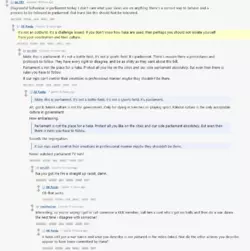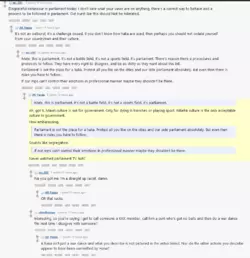Preserve Tube archive / https://www.rnz.co.nz/news/politica...es-bill-has-been-released-here-s-what-s-in-it Politics Te Ao Māori /
Opposition MPs and the public gallery stood to perform Ka Mate, after Hauraki Waikato MP Hana-Rawhiti Maipi-Clarke stood to deliver her Te Pāti Māori's vote against the bill.
The Speaker, Gerry Brownlee, who had expressed his lack of patience with a number of MPs for their interjections throughout the afternoon, suspended the sitting until the bells next ring.
---
The four-page Treaty Principles Bill has been introduced and will be debated in Parliament next week.
As with all bills, the text begins with an explanatory note, includes links to some of the advice provided about it, such as a regulatory impact statement, and sets out the specific wording the law would change if enacted.
All parties other than ACT have committed to voting the bill down at the second reading after it has been to select committee, which would stop it from passing into law.
The bill states it would set out the principles of the Treaty of Waitangi in legislation, and requires those principles to be used when interpreting legislation, where relevant.
The bill's final clause states nothing in the bill would amend the text of the Treaty of Waitangi or Te Tiriti o Waitangi.
A group of protestors had gathered in Auckland's Newmarket. Photo: RNZ / Marika Khabazi
The principles set out in the bill as introduced are:
Read more:
The bill's champion, ACT's David Seymour, hailed the introduction of the bill in a media release saying the principles of the Treaty "are not going anywhere".
"Either Parliament can define them, or the courts will continue to meddle in this area of critical political and constitutional importance. The purpose of the Treaty Principles Bill is for Parliament to define the principles of the Treaty, provide certainty and clarity, and promote a national conversation about their place in our constitutional arrangements."
He noted a change made to the earlier version, with the second principle having been narrowed "to provide that the rights of hapū and iwi differ from the rights everyone has a reasonable expectation to enjoy only when those rights are agreed to as part of a Treaty settlement. This has occurred because the previous wording was too broad".
The Principles of the Treaty of Waitangi Bill.
He said the Treaty itself would not be changed, just the way it was interpreted in law.
The change in timing came as the Waitangi Tribunal scrambled to publish the second part of its report on the Bill, and the treaty clause review set out in NZ First's coalition agreement.
It was a scramble because the Tribunal is typically unable to publish material related to government bills once they have been introduced.
Once it had been notified of the changed timing through an official memo from the government, it then informed the lawyers presenting evidence for its report so they could submit all their evidence in time.
Seymour accused the Tribunal of breaking the government's trust over the matter.
Te Pāti Māori co-leader Rawiri Waititi also condemned the earlier introduction, saying he believed it was aimed at halting the planned hīkoi. (The organisers have said they would not reschedule the hīkoi.)
Seymour said it was "much ado about nothing", however, and the change in date was simply part of normal Parliamentary processes.
That's somewhat backed up by most of the political parties, with Labour's Chris Hipkins saying they would not normally expect to be informed of a change in the date of introduction. The Greens, meanwhile, welcomed having the detail of the bill to scrutinise.
Prime Minister Christopher Luxon on Thursday defended the timing of the bill's introduction, saying he totally disagreed with the suggestion it was shifted to avoid the hīkoi.
"Totally disagree ... we've got a lot of legislation to do between now and Christmas and what we're doing here is when legislation becomes available - in this case it was a couple of weeks earlier, it was drafted, and the legislation's ready to go - we move legislation around all the time, so it's not unusual at all."
Luxon will not be in Parliament today for the bill's official tabling in the Debating Chamber - like other recent prime ministers he does not attend on Thursdays.
He will also not be in Parliament for the First Reading debate set down for next Thursday, as he will be in Peru for the APEC meeting. He will be at Parliament on the week of the planned hīkoi.
"Their criticism is not surprising, in fact it's expected because the Treaty Principles Bill by defining the principles does the job that they've been supposed to do for the last 48 years, so it's not surprising that they resent that job being done by Parliament. Parliament asked them to do it in 1975, and Parliament has the right to say 'Well, if you haven't done a very good job we're going to do it for you'."
He pushed back at the suggestion his bill was not a faithful interpretation.
"I'd just make the argument that any interpretation of the Treaty must be consistent with a liberal democracy and give equal rights to each person that has to live in this country, as the only country they have.
"Their version says that the Treaty is a partnership and that some people are in partnership with the Crown and others are not. Their version is inconsistent with a liberal democratic framework and that's why I think it's time for Parliament to step in and say 'actually we do want to respect the treaty, we'd like to honour the treaty, but in a way that gives equal rights to all because that's how liberal democracy works."
---
REDDIT CRINGE:
https://old.reddit.com/r/newzealand/comments/1gqvnkw/comment/lx1cg4m/?context=8
Redditors are soying all over it. Apparently this is up there with Brady's fifth ring or something (not true). Some chuds are calling it dumb.

https://old.reddit.com/r/newzealand/comments/1gqvnkw/comment/lx24a5n/?context=8
We should also have a young congresswoman whose job involves performing ceremonial chimpouts every few weeks. I nominate Sydney Sweeney.

https://old.reddit.com/r/newzealand/comments/1gqvnkw/comment/lx1wemh/?context=8
Apparently they're imported and are not a fan of ceremonial tantrums.

https://old.reddit.com/r/newzealand/comments/1gqvnkw/comment/lx1pl66/?context=8
https://old.reddit.com/r/newzealand/comments/1gqvnkw/comment/lx22sdf/?context=8
Segregation is when you're asked to behave like a normal person in congress.

The youngest member of New Zealand’s parliament, Māori Party MP Hana-Rawhiti Kareariki Maipi-Clarke, started a haka to protest the first vote on a contentious bill that would reinterpret a 184-year-old treaty between the British and Indigenous Maori. The parliament was briefly suspended on Thursday after the protest. First signed in 1840 between the British Crown and more than 500 Maori chiefs, the Treaty of Waitangi lays down how the two parties agreed to govern. The interpretation of clauses in the document still guides legislation and policy today.
The Treaty Principles Bill has been released: Here's what's in it /
Watch: Haka interrupts vote for the Treaty Principles Bill
A haka led by Te Pāti Māori interrupted voting for the Treaty Principles Bill this afternoon.Opposition MPs and the public gallery stood to perform Ka Mate, after Hauraki Waikato MP Hana-Rawhiti Maipi-Clarke stood to deliver her Te Pāti Māori's vote against the bill.
The Speaker, Gerry Brownlee, who had expressed his lack of patience with a number of MPs for their interjections throughout the afternoon, suspended the sitting until the bells next ring.
---
The four-page Treaty Principles Bill has been introduced and will be debated in Parliament next week.
As with all bills, the text begins with an explanatory note, includes links to some of the advice provided about it, such as a regulatory impact statement, and sets out the specific wording the law would change if enacted.
All parties other than ACT have committed to voting the bill down at the second reading after it has been to select committee, which would stop it from passing into law.
The bill states it would set out the principles of the Treaty of Waitangi in legislation, and requires those principles to be used when interpreting legislation, where relevant.
The bill's final clause states nothing in the bill would amend the text of the Treaty of Waitangi or Te Tiriti o Waitangi.
A group of protestors had gathered in Auckland's Newmarket. Photo: RNZ / Marika Khabazi
The principles set out in the bill as introduced are:
- Principle 1: The Executive Government of New Zealand has full power to govern, and the Parliament of New Zealand has full power to make laws, (a) in the best interests of everyone; and (b) in accordance with the rule of law and the maintenance of a free and democratic society.
- Principle 2: (1) The Crown recognises, and will respect and protect, the rights that hapū and iwi Māori had under the Treaty of Waitangi/te Tiriti o Waitangi at the time they signed it. (2) However, if those rights differ from the rights of everyone, subclause (1) applies only if those rights are agreed in the settlement of a historical treaty claim under the Treaty of Waitangi Act 1975
- Principle 3: (1) Everyone is equal before the law. (2) Everyone is entitled, without discrimination, to (a) the equal protection and equal benefit of the law; and (b) the equal enjoyment of the same fundamental human rights.
Read more:
The bill's champion, ACT's David Seymour, hailed the introduction of the bill in a media release saying the principles of the Treaty "are not going anywhere".
"Either Parliament can define them, or the courts will continue to meddle in this area of critical political and constitutional importance. The purpose of the Treaty Principles Bill is for Parliament to define the principles of the Treaty, provide certainty and clarity, and promote a national conversation about their place in our constitutional arrangements."
He noted a change made to the earlier version, with the second principle having been narrowed "to provide that the rights of hapū and iwi differ from the rights everyone has a reasonable expectation to enjoy only when those rights are agreed to as part of a Treaty settlement. This has occurred because the previous wording was too broad".
The Principles of the Treaty of Waitangi Bill.
He said the Treaty itself would not be changed, just the way it was interpreted in law.
Timeline
- Bill introduced to Parliament 7 November
- Hīkoi protesting the bill begins on 10 November, departing Cape Reinga on the 11th, to arrive at Parliament on 19 November
- First reading debate on the bill during the week of 11-15 November. Prime Minister Christopher Luxon will not be in the country during that reading
- After first reading, Bill to be sent to select committee for six-month public hearing process
- After select committee, Bill to be sent for second reading debate in Parliament - where all parties but ACT have promised to vote it down
Kerfuffle over early introduction
News broke on Tuesday that the bill would be introduced to Parliament this week - a fortnight earlier than had previously been expected.The change in timing came as the Waitangi Tribunal scrambled to publish the second part of its report on the Bill, and the treaty clause review set out in NZ First's coalition agreement.
It was a scramble because the Tribunal is typically unable to publish material related to government bills once they have been introduced.
Once it had been notified of the changed timing through an official memo from the government, it then informed the lawyers presenting evidence for its report so they could submit all their evidence in time.
Seymour accused the Tribunal of breaking the government's trust over the matter.
Te Pāti Māori co-leader Rawiri Waititi also condemned the earlier introduction, saying he believed it was aimed at halting the planned hīkoi. (The organisers have said they would not reschedule the hīkoi.)
Seymour said it was "much ado about nothing", however, and the change in date was simply part of normal Parliamentary processes.
That's somewhat backed up by most of the political parties, with Labour's Chris Hipkins saying they would not normally expect to be informed of a change in the date of introduction. The Greens, meanwhile, welcomed having the detail of the bill to scrutinise.
Prime Minister Christopher Luxon on Thursday defended the timing of the bill's introduction, saying he totally disagreed with the suggestion it was shifted to avoid the hīkoi.
"Totally disagree ... we've got a lot of legislation to do between now and Christmas and what we're doing here is when legislation becomes available - in this case it was a couple of weeks earlier, it was drafted, and the legislation's ready to go - we move legislation around all the time, so it's not unusual at all."
Luxon will not be in Parliament today for the bill's official tabling in the Debating Chamber - like other recent prime ministers he does not attend on Thursdays.
He will also not be in Parliament for the First Reading debate set down for next Thursday, as he will be in Peru for the APEC meeting. He will be at Parliament on the week of the planned hīkoi.
Tribunal's findings
The Tribunal's second report on the bill found that:- The Crown's process to develop the Bill has purposefully excluded any consultation with Māori, breaching the principle of partnership, the Crown's good-faith obligations, and the Crown's duty to actively protect Māori rights and interests
- This policy process is in breach of the principle of good government, as Cabinet has decided to progress the Bill despite it being a policy that is not evidence-based, has not been adequately tested, has not been consulted upon, and fails regulatory standards
- The proposed content of the Bill does not reflect the texts or meaning of the Treaty/te Tiriti
- Principle 1 misinterprets the kāwanatanga granted to the Crown in 1840, which is not an unbridled power restrained only by its own sense of what is in the best interests of everyone
- Cabinet's approval of Principle 2 for introduction in a Bill was found to be a breach of the principles of tino rangatiratanga, kāwanatanga, partnership, and active protection
- Principle 2, if enacted, would revoke the promises and guarantees the Queen made to Māori in 1840
- Principle 3 bears no resemblance to the meaning of article 3 and that Cabinet's decision to introduce the principle in a Bill was a breach of the Treaty/te Tiriti principles of partnership, equity, and active protection
- These breaches caused significant prejudice to Māori
- Māori would be particularly prejudiced by the extinguishment of tino rangatiratanga in a legal sense if the Bill were to be enacted
- The new principles would advance the discredited agenda of assimilation, as they are designed to end the distinct status of Māori as the indigenous people of this country
- Even if the Bill were not enacted, Cabinet's decision to introduce the Bill would prejudice Māori by further damaging the Māori-Crown relationship, and Māori would feel the brunt of the social disorder and division, including through the select committee process.
- If the Government does not abandon the Bill, the Tribunal recommended that, given the constitutional significance of the issue, the Bill be referred to the Tribunal under section 8(2) of the Treaty of Waitangi Act 1975
"Their criticism is not surprising, in fact it's expected because the Treaty Principles Bill by defining the principles does the job that they've been supposed to do for the last 48 years, so it's not surprising that they resent that job being done by Parliament. Parliament asked them to do it in 1975, and Parliament has the right to say 'Well, if you haven't done a very good job we're going to do it for you'."
He pushed back at the suggestion his bill was not a faithful interpretation.
"I'd just make the argument that any interpretation of the Treaty must be consistent with a liberal democracy and give equal rights to each person that has to live in this country, as the only country they have.
"Their version says that the Treaty is a partnership and that some people are in partnership with the Crown and others are not. Their version is inconsistent with a liberal democratic framework and that's why I think it's time for Parliament to step in and say 'actually we do want to respect the treaty, we'd like to honour the treaty, but in a way that gives equal rights to all because that's how liberal democracy works."
---
REDDIT CRINGE:
https://old.reddit.com/r/newzealand/comments/1gqvnkw/comment/lx1cg4m/?context=8
Redditors are soying all over it. Apparently this is up there with Brady's fifth ring or something (not true). Some chuds are calling it dumb.

https://old.reddit.com/r/newzealand/comments/1gqvnkw/comment/lx24a5n/?context=8
We should also have a young congresswoman whose job involves performing ceremonial chimpouts every few weeks. I nominate Sydney Sweeney.
https://old.reddit.com/r/newzealand/comments/1gqvnkw/comment/lx1wemh/?context=8
Apparently they're imported and are not a fan of ceremonial tantrums.

https://old.reddit.com/r/newzealand/comments/1gqvnkw/comment/lx1pl66/?context=8
https://old.reddit.com/r/newzealand/comments/1gqvnkw/comment/lx22sdf/?context=8
Segregation is when you're asked to behave like a normal person in congress.


